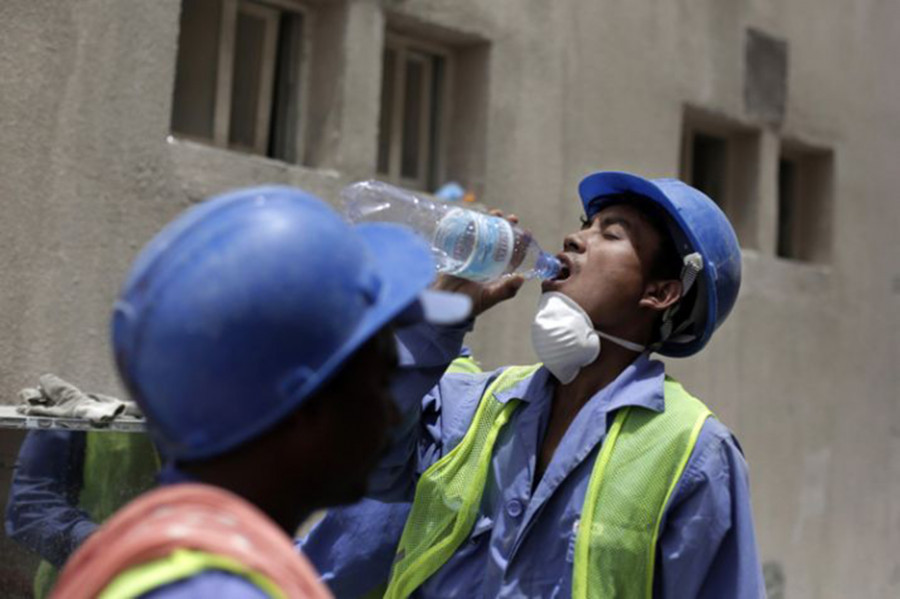Editorial
Hot and dangerous
At COP28, Nepal should negotiate with Gulf countries to prioritise the well-being of its citizens.
Nepali migrant workers in the Middle East toil day in and out under the scorching sun and heat, which unfortunately leads to many untimely deaths. Moreover, those who return to their home country often carry the burden of serious health problems like kidney failure, cardiac issues and other ailments. The World Health Organisation warns that excessive heat worsens existing health conditions and results in premature death and disability. As per a recent report titled “Killer Heat: The Impact of Extreme Temperatures and Climate Change on Migrant Workers in the Gulf,” the extreme heat and rising temperatures owing to climate change will make this reality faced by migrant workers “an urgent global issue.” It calls out countries to take immediate steps to prevent further harm to these vulnerable workers.
Despite facing challenges such as meagre wages (which still surpass the amount they earn in Nepal), exorbitant recruitment costs, job mismatch, and labour rights violations, Nepalis continue to go to the Middle East and Gulf countries in high numbers. In 2021 alone, over 620,000 Nepali workers moved to these countries. Unfortunately, between June 2008 and February 2022, 10,482 Nepali workers died.
While medical screenings are done and orientation programmes given to aspiring workers pre-departure, they don’t seem effective. A research titled “Health and wellbeing of Nepalese migrant workers in Golf Cooperation Council (GCC) countries” shows that only after the government of Nepal took the flak for failing to protect migrant workers did it update the orientation conducted by the Foreign Employment Promotion Board of Nepal. Little do the workers know what to expect in foreign lands, and if such screenings and programmes are not effectively delivered, workers are bound to suffer.
Workers need a friendly work environment and effective strategies, such as regular breaks, to combat heat stress. Unfortunately, many employers even fail to give workers sufficient water to stay hydrated. Employers must ensure easy access to water, air-conditioned accommodations, and ample food for those who work long hours. In addition, primary health care kits and services should be handy at all times.
Sadly, many capitalist economies are reluctant to do even the bare minimum to protect the health and well-being of those who contribute to their prosperity. This is evident in the lack of compensation for abuses, unexplained deaths, and wage theft related to the 2022 Fifa World Cup. The “Killer Heat” report also states that none of the six GCC countries—which include Saudi Arabia, Bahrain, Oman, Kuwait, the United Arab Emirates and Qatar—has laws to adequately protect workers from extreme heat conditions, and they lack data on deaths and injuries.
This year, as the UAE prepares to host COP28, the annual global climate conference, it’s important to address the challenges faced by migrant workers braving extreme temperatures. The Nepali delegation at the conference should ask their counterparts from the Middle Eastern and the Gulf to prioritise the well-being of their toiling citizens. This is not just a matter of keeping the economies of the labour sending and receiving countries humming. In the larger picture, it is about respecting the dignity of each and every human being.




 8.22°C Kathmandu
8.22°C Kathmandu














